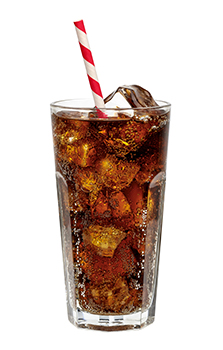More Health and Nutrition Bites
Related
More evidence against sweet drinks
If you've been reading the Dr. Gourmet's Health & Nutrition Bites for even a little while, you are probably aware that I'd much rather you drank water, coffee, or tea rather than sugar-sweetened beverages. Aside from the fact that they are too often excess, empty calories, we have seen in multiple studies that apart from their caloric content they have been linked with a greater risk of stroke, poorer metabolic scores, and may contribute to higher blood pressures.
Sugar-sweetened beverage sales ban contributes to lower intake
While by no means the only culprit in the ongoing obesity crisis, sugar-sweetened beverages certainly play a significant role in overweight, obesity, and related health problems. Research has shown that drinking sugar-sweetened soft drinks contributes to weight gain and that those who consume the most calories from these beverages have poorer metabolic scores, including insulin resistance. Indeed, women who drink more sugar-sweetened soft drinks have a greater risk of stroke, and the list of studies linking poorer health and health outcomes with sugar-sweetened beverages just keeps getting longer.
Taxing sugary drinks cuts purchases
It's clear that those who drink more sugar-sweetened beverages have higher body weight, and often that also means higher levels of body fat and greater waist circumference. All three (higher body weight, body fat, and waist circumference) are associated with greater risk of diabetes, heart disease, and other chronic conditions, including cancers.
Health & Nutrition Bites
Get the latest health and diet news - along with what you can do about it - sent to your Inbox once a week. Get Dr. Gourmet's Health and Nutrition Bites sent to you via email. Sign up now!
Beverage taxes work

I talked just last week about the dangers of drinking sugar-sweetened beverages and repeated my recommendation that people drink water, tea, or coffee.
If only it were that easy to get people to stop drinking sodas. One of the ways people have tried to influence how much soda people are drinking is by taking a note from the fight against smoking: tax it.
Despite the clear evidence that taxing cigarettes has reduced the sales of cigarettes, there's been conflicting evidence that taxing beverages will do the same.
A study just published in the Annals of Internal Medicine (2020;172:380-397) looks at the effect of a 1-cent-per-ounce tax on sugar-sweetened and artificially-sweetened beverages implemented in Cook County, Illinois in August of 2017. Unfortunately, the statute was repealed just four months later
Dr. Lisa Powell of the University of Illinois at Chicago and her team obtained the retail sales records of all nonalcoholic beverages sold in all supermarkets, grocery stores, convenience and drug stores, mass merchandise and dollar stores located within the borders of Cook Count during the four months of 2017 that the tax was in place, as well as the records from the same dates the year previous: 2016. Knowing that some people might simply buy their beverages where the tax was lower, they also acquired the same sales records from the surrounding area within 2 miles of the borders of Cook County.
As a comparison, they also acquired that same information from the same periods of time from St. Louis County, Missouri, a similarly-sized area without a beverage tax.
The researchers classified the taxed beverages into 5 types: soda, sports drinks, energy drinks, tea or coffee, and juice drinks. Untaxed beverages were water, unflavored milk, and unsweetened juice.
When the authors compared the average volume of sales of the taxed beverages in St. Louis from 2016 with those of 2017, the amounts were basically the same. Cook County, however, sold 27% less in 2017 than it did in 2016.
As the authors had expected, sales of taxed beverages went up in the border areas around Cook County by about 39%, with the purchase of soda alone going up a little over 50%. (Interestingly, people seemed to be mostly buying family-sized amounts - liters or multi-packs - rather than individual-sized servings.)
After calculating the increase in volume outside the borders of Cook County versus the decrease in volume within Cook County, the authors found that the overall intake of sugar-sweetened and artificially-sweetened beverages still dropped by 21%. Artificially-sweetened beverages fell more than sugar-sweetened beverages, but soda represented the largest drop of all sugar-sweetened beverages.
Untaxed beverages? Volume of sales remained about the same.
What this means for you
This certainly supports the idea that taxing sugar-sweetened beverages will help reduce their consumption. No, it won't eliminate it entirely - after all, people still smoke - but it can help.
Even better, it would be a good idea to earmark the funds generated by that tax to go toward healthcare related to obesity: Cook County took in over $60 million in those four months. From a 1-cent-per-ounce tax.
First posted: March 18, 2020

